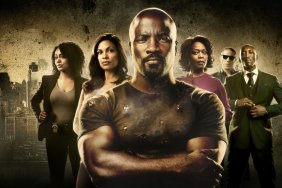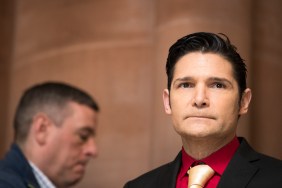Oscar Wilde once argued that the only thing worse than being talked about was not being talked about. It’s a philosophy that many still adhere to in the 21st Century, when any publicity is still basically considered good publicity. More people have probably seen Troll 2 after hearing that it was legendarily awful than would ever have seen it if that particular cheese bomb was still trapped in obscurity.
But it also works the other way around. The fact that a film isn’t being talked about, at all, is often interpreted as evidence that it sucks. For example, consider the film Dark Places. It’s a thriller based on a successful novel by Gone Girl author Gillian Flynn. It stars Academy Award winner Charlize Theron and her Mad Max: Fury Road co-star Nicholas Hoult. It came out this year. And nobody is talking about it, at all.
This is a situation that arises fairly often in the world of instant streaming, where Dark Places now languishes at Amazon Prime. Everything about this film’s pedigree makes it sound like it should be worth clicking on, except the fact that it has an awesome pedigree and they’re practically giving it away. It’s enough of a red flag to make even applying pressure with your thumb seem like a waste of energy, but the only way to know for sure is to actually watch the danged thing. So we did.

Previously: Now Streaming | Five Underrated Horror Movies
And it turns out that although Dark Places is no Gone Girl, it’s also not a turkey. It’s a grimy murder mystery about Libby Day (Theron), who survived a notorious murder spree as a child, but who can no longer live off the royalties from her personal tragedy. Rather than get a real job she falls in with a so-called “Kill Club” of amateur sleuths who think that the real killer is still at large. They pay Libby to investigate the crime decades after it was committed, but only a few weeks before the convicted killer is sentenced to die; a killer who, not for nothing, is also Libby’s brother, played by Ant-Man villain Corey Stoll.
It’s a pulpy mystery wrapped around a melodramatic tale of familial strife, not unlike Gone Girl. But the similarities more or less end there. David Fincher wisely amped up marital woes in Gone Girl, turning an otherwise implausible crime thriller into a broad indictment of everyone’s romantic relationships, everywhere. There was a universality to Gone Girl that made the sillier twists endurable, and even laudable. You can sympathize with a man torn to pieces by the media circus surrounding his wife’s disappearance, and you can even sympathize with his wife, who seems to be fighting – for better or worse – against a society that demanded she meet an unrealistic standard of perfection.

But Dark Places is an incredibly specific story, about a woman who has grown up in a unique situation and whose perspective – though understandable – is probably alien to anybody in the audience. She’s been capitalizing on the murder of her family for decades, and seems completely detached from any relationship that isn’t centered on her personal gain. Or maybe a lot of people can sympathize with that situation, but common decency basically precludes anyone from admitting it.
Specificity can be a good thing. The uniqueness of a character or a storyline can be intriguing enough to lure the audience into places, dark places for example, they might not otherwise be willing to go. The very idea of a Kill Club is creepy but plausible, and spending a lot of time within those ranks might have been a selling point. Unfortunately, Libby only visits the actual club one time and then sets about her mission, solving an old murder by visiting people, hearing their stories, and then visiting more people and hearing more stories, and then finally finding out who actually did the deed.

That’s what most murder mysteries boil down to, and it’s not inherently a bad premise, but it only works when the detective (amateur or professional) learns fascinating things about fascinating people who were involved in fascinating crimes. Dark Places has a stellar cast – Theron, Hoult, Stoll, Christina Hendricks, Chloe Grace Moretz, Sean Bridgers – but they’re mired in a familiar Southern Gothic storyline about failing farms and sexual scandals and satan worship. Distinctive performers in nondescript situations, filmed through the pervasively greasy lens of a post-Se7en serial killer movie.
The story and the tone rarely spike in interesting ways, so all we’re left with is the nuts and bolts of the mystery itself. Fortunately, this is where Gillian Flynn’s story actually shines. The story of Dark Places intercuts between Libby’s sleuthing and flashbacks to the fateful day of the murders, and when they finally wind up at the same conclusion the film earns an unexpected and creepy climax. It’s such a noteworthy, pulpy finale that it’s hard not to recommend Dark Places if only in the context of instant streaming, where all you have to justify is a couple of hours of your time, and not the additional cost of a ticket, a parking space and overpriced concessions.
But there is a reason Dark Places isn’t being discussed. It’s not because Gilles Paquet-Brenner’s film is bad, it’s because it’s unremarkable. And say what you will about Gone Girl, whether you loved it or hated it, it’s the sort of film that leaves you talking at the end. Maybe you’re talking about about the film’s nihilistic approach to 21st Century romance, or maybe you’re talking just about that one weird masturbatory blood orgy, but you are definitely talking about it. Dark Places doesn’t leave us with anything to talk about, except maybe for the fact that Oscar Wilde was right all along. (As he was about pretty much everything else.)
Photos: A24
William Bibbiani (everyone calls him ‘Bibbs’) is Crave’s film content editor and critic. You can hear him every week on The B-Movies Podcast and watch him on the weekly YouTube series Most Craved and What the Flick. Follow his rantings on Twitter at @WilliamBibbiani.







